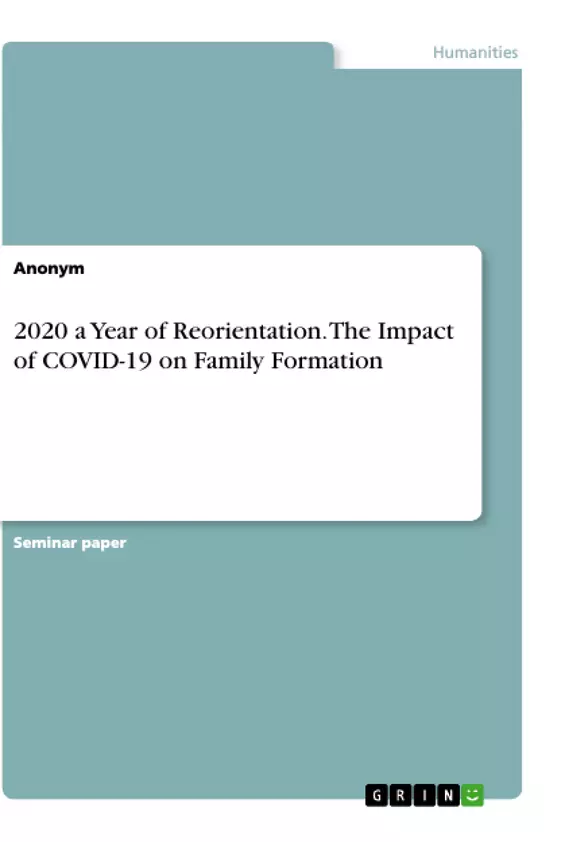The aim of this paper is to illustrate the current development of the effect of COVID-19 on couples intending to start a family. The problems they face regarding marriage and childbearing during the pandemic should be elaborated and outlined. For this purpose, comparative situations of pandemical states from the past will be used as a reference. Using the assessment of current problems, future consequences of the pandemic on family formation will be sketched out. This paper seeks to examine the effect of the current pandemic as an exceptional situation on the emergence and formation of a family. This includes a brief outline of psychological health and its impact on relationship stability, fertility intentions, financial hardship, and effects on the quality of a marriage and the consequences of divorce.
Inhaltsverzeichnis (Table of Contents)
- Overview of the structure
- Literature review
- Pathways to parenthood
Zielsetzung und Themenschwerpunkte (Objectives and Key Themes)
This paper aims to explore the impact of the COVID-19 pandemic on couples intending to start a family. It examines the challenges they face in relation to marriage and childbearing during this exceptional period, drawing comparisons with past pandemics to provide insights into potential long-term consequences. The paper seeks to answer the question: To what extent are the effects of the corona pandemic affecting couples' family formation?
- Impact of COVID-19 on family formation
- Challenges faced by couples in marriage and childbearing during the pandemic
- Comparison with past pandemics to understand potential long-term consequences
- Psychological, social, and economic effects of the pandemic on family formation
- Future implications for family formation and intervention strategies
Zusammenfassung der Kapitel (Chapter Summaries)
- Overview of the structure: This chapter outlines the structure of the paper, detailing the content of each section and its contribution to the overall research question.
- Literature review: This chapter discusses the methodology used in the paper, including the sources of literature, the approach applied, and the geographical and historical scope of the study. It highlights the growing body of research on the impact of the pandemic on well-being and the need for micro-level perspectives to understand the difficulties of young people and families.
- Pathways to parenthood: This chapter explores the concept of family formation as a planned intention in democratic relationships, focusing on cohabitation, fertility intentions, and the transition from cohabitation to marriage. It examines how different meanings and associations are attributed to cohabitation in relation to childbearing and the role of cultural factors and institutional regulations in shaping family formation across different nations.
Schlüsselwörter (Keywords)
This paper focuses on the key themes of COVID-19, family formation, psychological effects of pandemics, relationship stability, fertility intentions, financial hardship, marriage quality, and divorce. It examines the impact of the pandemic on couples intending to start a family and seeks to understand the potential long-term consequences for family formation and societal well-being. The research draws upon literature from sociology, psychology, and social sciences to provide a comprehensive overview of this critical issue.
- Quote paper
- Anonym (Author), 2021, 2020 a Year of Reorientation. The Impact of COVID-19 on Family Formation, Munich, GRIN Verlag, https://www.grin.com/document/1015116



